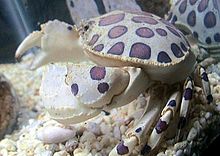- Hepatus epheliticus
-
Hepatus epheliticus 
Scientific classification Kingdom: Animalia Phylum: Arthropoda Subphylum: Crustacea Class: Malacostraca Order: Decapoda Infraorder: Brachyura Family: Aethridae Genus: Hepatus Species: H. epheliticus Binomial name Hepatus epheliticus
(Linnaeus, 1763)Synonyms [1] - Cancer epheliticus Linnaeus, 1763
- Cancer decorus Herbst, 1803
- Cancer vanbenedenii Herklots, 1852
Hepatus epheliticus, known by various names, including the calico crab, Dolly Varden crab and Leopard crab, is a species of crab. It lives in shallow water in the western Atlantic Ocean from the Chesapeake Bay to the Dominican Republic. It has a 3 in–wide carapace adorned with large red spots with darker outlines.
Contents
Description
C. epheliticus grows to 3 inches (76 mm) across the carapace,[2] which is covered in large patches of red color, which may join up into lines or other patterns.[3] The spots are outlined in a darker color; in some crabs, only the darker rings are visible.[4]
Distribution
The range of C. epheliticus extends from the Chesapeake Bay southwards, including the whole of the Gulf of Mexico, and as far south as Jamaica and the Dominican Republic.[3]
Ecology and life cycle
C. epheliticus lives at depths of up to 46 metres (151 ft) on sandy and muddy substrates.[3] It often carries the sea anemone Calliactis tricolor on its back,[5] or lies buried in the sand, with only its eyes exposed.[6]
Reproduction occurs in summer, as shown by the occurrence of "berried" (egg-bearing) females.[5] The eggs are held by the female until they hatch; there are five planktonic zoea stages.[7]
Taxonomy
H. epheliticus was first described, under the name Cancer epheliticus, by Carl Linnaeus in his 1763 work Centuria Insectorum,[8] based on specimens from Carolina sent to him by Alexander Garden.[9] Subjective synonyms of H. epheliticus include Cancer decorus, published by Johann Friedrich Wilhelm Herbst in 1803, and Cancer vanbenedenii, published by Jan Adrian (or Janus Adrianus) Herklots in 1852.[1]
C. epheliticus is known by several common names, including calico box crab,[3] calico crab,[4] Gulf calico crab,[6] and Dolly Varden crab.[4]
References
External identifiers for Hepatus epheliticus EOL 343701 ITIS 98348 NCBI 6799 WoRMS 158420 Also found in: Wikispecies - ^ a b Peter K. L. Ng, Danièle Guinot & Peter J. F. Davie (2008). "Systema Brachyurorum: Part I. An annotated checklist of extant Brachyuran crabs of the world" (PDF). Raffles Bulletin of Zoology 17: 1–286. http://rmbr.nus.edu.sg/rbz/biblio/s17/s17rbz.pdf.
- ^ Edward E. Ruppert & Richard S. Fox (1988). "Box crabs". Seashore animals of the Southeast: a guide to common shallow-water invertebrates of the southeastern Atlantic Coast. University of South Carolina Press. pp. 252–253. ISBN 9780872495357. http://books.google.co.uk/books?id=5zkA5zzZPuwC.
- ^ a b c d Harriet Perry & Kirsten Larsen (April 2, 2004). "A Picture Guide to Shelf Invertebrates from the Northern Gulf of Mexico" (PDF). http://www.gsmfc.org/seamap/picture_guide/Crabs/hepatus%20epheliticus.pdf. Retrieved June 17, 2010.
- ^ a b c Gilbert L. Voss (2002). "Calico crab, Dolly Varden crab". Seashore Life of Florida and the Caribbean. Dover pictorial archive series. Courier Dover Publications. pp. 98. ISBN 9780486420684.
- ^ a b Susan B. Rothschild (2004). "Crabs". Beachcomber's Guide to Gulf Coast Marine Life: Texas, Louisiana, Mississippi, Alabama, and Florida (3rd ed.). Taylor Trade Publications. pp. 30–31. ISBN 9781589790612. http://books.google.co.uk/books?id=w0hWmtbRNwIC.
- ^ a b Eugene H. Kaplan (1999). A Field Guide to Southeastern and Caribbean Seashores: Cape Hatteras to the Gulf Coast, Florida, and the Caribbean. Peterson Field Guides (2nd ed.). Houghton Mifflin Harcourt. ISBN 9780395975169. http://books.google.co.uk/books?id=Ekfhub2YU5EC.
- ^ Maria L. Negreiros-Fransozo, Adilson Fransozo & Gustavo L. Hirose (2008). "The megalopa and early juvenile development of Hepatus pudibundus (Crustacea: Brachyura: Aethroidea) reared from neuston samples". Revista Brasileira de Zoologia 25 (4): 608–616. doi:10.1590/S0101-81752008000400005.
- ^ Gilberto Rodriguez (1993). "From Oviedo to Rathbun: The development of brachyuran crab taxonomy in the Neotropics (1535–1937)". In Frank Truesdale. History of carcinology. Volume 8 of Crustacean Issues. CRC Press. pp. 41–73. ISBN 9789054101376. http://books.google.co.uk/books?id=oMQTwzwQXakC.
- ^ Carl Linnaeus (1763) (in Latin) (PDF). Centuria Insectorum Rariorum. Uppsala. http://huntbot.andrew.cmu.edu/HIBD-PDF/LinnaeanDiss/Liden-129.pdf.
Categories:- Crabs
- Crustaceans of the Atlantic Ocean
- Animals described in 1763
Wikimedia Foundation. 2010.
